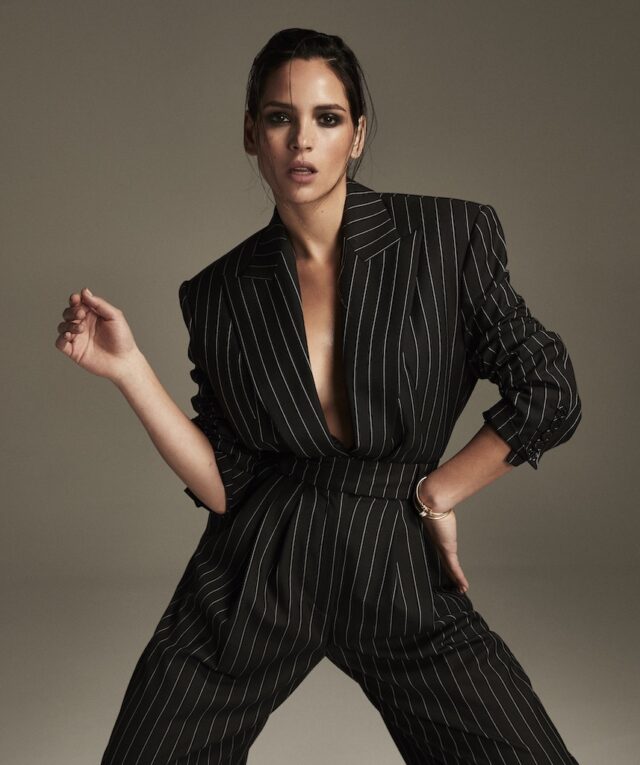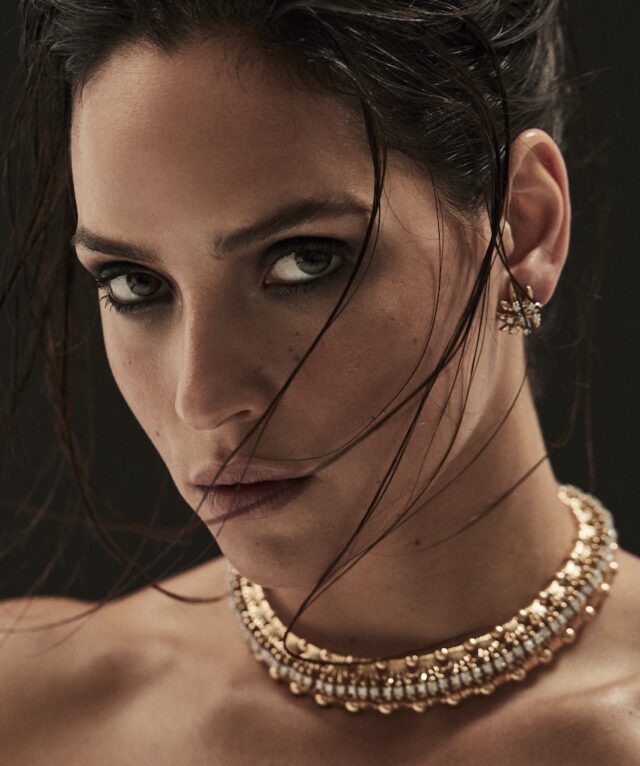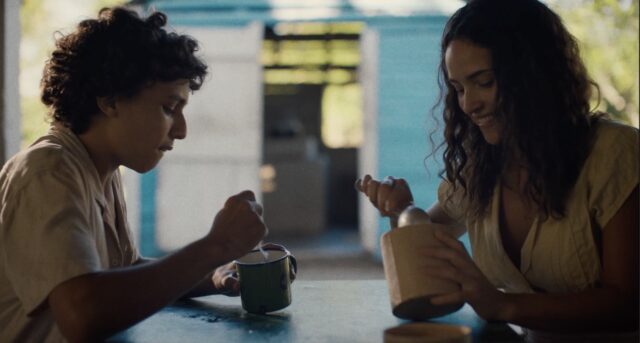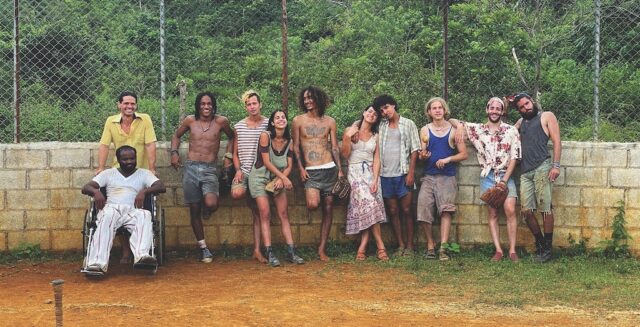
As the female focus of the tragicomic indie Los Frikis, Adria Aronja taps into her rich multicultural influences—Puerto Rican, Guatemalan, Mexican and American—to bring to the screen a dynamic portrayal of Maria, a sanatorium nurse, that has critics cheering and the actress declaring it her personal best, alongside memorable performances in the TV series True Detective, and films Father of the Bride and Hit Man. Cristina Cuomo talks with Arjona about her wellness rituals, family ties, the importance of community, and her skyrocketing career.
CRISTINA CUOMO: Los Frikis is coming to the Hamptons International Film Festival. It’s inspired by real-life events that took place in Cuba in the early 1990s, when a group of punk rockers in search of freedom infected themselves with HIV so that they could live in a state asylum and create utopia based around playing music. The performances are so compelling. Tell me about what intrigued you about the film.
ADRIA ARJONA: When I first read the script, I was so baffled by the fact that I had never heard about this story; it was a point in Latin American history that I didn’t quite know existed. It just felt so punk rock and cool, with an edge to it. There was heartbreak, comedy and two huge love stories in the movie. Filming it was the best experience of my life. It is the most important movie I have made, and probably will ever make. A lot of these actors had never left Cuba before filming this movie. Seeing life through their perspective was such a gift.
CC: I’m excited to talk to you about the movie, but I wanted to dive in a little bit to your heritage and multicultural upbringing. Your mother is Puerto Rican and your father is Guatemalan and you grew up in Mexico City and then lived in Miami before moving to New York City. How has your multicultural upbringing influenced your worldview and your work?
AA: I think it defines me as an artist, for sure. I have a Guatemalan background and a Puerto Rican background, that islander energy, but also a little bit more reserved Central American side. I flip-flop between them; there are some characters that need a little bit more of one than the other. I think it’s an identity that I really dance in. Growing up, I really struggled to identify with one or the other. As I’m getting older, it’s so cool that I get to be more than one thing, that I’m not patriotic toward one land, but that I can really pull and grab from so many different places. I feel so lucky that I’ve been able to travel and meet different people and really stimulate and challenge my brain. At the end of the day, what I kind of steal from is people when I create characters. I’ve been lucky that I’ve been exposed to a lot of it. A lot of people all over the world think that Latin Americans are just one thing, and really we’re diverse within our community. My Puerto Rican family cannot be more different than my Guatemalan family, and I also grew up in Mexico, and that culture cannot be more different. I just feel really lucky that I have all these little forces to grab from.
CC: Your father is a singer-songwriter. Do you have music in your blood, too?
AA: I don’t. I think I was destined to be a pop star in my head, but I can’t sing, so that didn’t go off very well. It’s funny. When your father is so good at something you kind of shy away from that, and I did growing up. My dad put me in music class and wanted me to play all these instruments. I really wanted to find my own things, so I gravitated toward dance and acting. Now I kind of regret it. I should have listened to my father and picked up an instrument. I would have been an amazing guitar player by now at 32, after years of practice.
CC: So you moved to New York and attended acting school. Did you always want to be an actor?
AA: Moving around a lot, I kind of got into a shell and started getting really shy. My dad said, You’ve got to get out of your shell. Take photography classes. Get into acting. I did. I got into acting and I found my voice within it. I found escapism within the art form—I could be whoever I wanted, whenever I wanted, and it was so freeing. I just fell in love with it, and then I really didn’t want to start working until I felt ready. I didn’t audition for years. I went to my first audition at 19 or 20. I just wanted to make sure that I knew what I was doing, that I felt comfortable.

CC: Also, early in your career you got cast in Season 2 of True Detective.
AA: I’d rewatched Episode 5 of Season 1 of True Detective over and over. I had never seen a sequence be so impactful. I was like, I have to be on that show. By that point I had graduated from The Lee Strasberg Theatre & Film Institute, and I was more confident than ever. I thought, I can do anything. So much so that I finagled and lied my way through into that audition. They weren’t needing just any actor, so I called the casting office and pretended to be my manager. It was this whole thing that I did, but I got the job. By the time I was on set, I had never felt so much pressure, and have never felt so lucky.
CC: The past few years have been really big for you, with Father of the Bride and Hit Man, which everybody loved. You’re in a very enviable position right now, with the projects you’re doing. What kinds of roles do you relish playing?
AA: I always want to keep challenging myself. I love bouncing between characters and between genres and styles, whether it’s a movie or a TV show, a streaming film or a theatrical release. I just like jumping back and forth. It keeps me incredibly entertained, and it keeps me growing. My next movie is Splitsville with Dakota Johnson, directed by Michael Angelo Covino. It’s a small movie, funny, perky and amazing. I’m so excited to jump into it. People are asking me, When is your superhero role coming? When is your big thing? I just really like keeping things as authentic to myself in the moment as possible.

CC: Tell me how you prepared for the role of Maria in Los Frikis.
AA: A lot of it was through conversations with [writer-directors] Michael Schwartz and Tyler Nilson. Once we got to Santo Domingo, to Las Terrenas, the environment and the heat did something that was interesting to all of us. Tyler never wears shoes, and I didn’t either, for two months while filming this movie. It was so freeing. Maria is such a simple character, and also very complex. When it came to creating her look, I never stepped into the hair or makeup trailer. I put salt water in my hair and cream on my face, whatever she would have had available to her. I worked on my accent with an accent coach, and then threw that out of the window the second I met the actors. The best lesson in the world was just to be with them and hang out with them. They sort of contaminated me with this beautiful light and joy that being a Cuban gives you from birth. Eros de la Puente is probably one of the best actors out there, and it’s his first movie. It was like a master class, working with Héctor Medina.
It’s really cool for Tyler and Michael to showcase new Latin American talent. You have to understand that people never do that, especially with Latin Americans—they hire someone known. Tyler and Michael said, We have to go as authentic as we can. They got first-time actors from the island. I was a producer on the movie and I was part of those conversations. It was important to them for me to be a producer in this film as well, and for me to have a voice in it. They were the first to give me a seat at the table. I’m forever thankful to them.

CC: Community is so powerful in this film. It’s really quite beautiful.
AA: It really is. That also came from the way that Michael and Tyler make a film. We all lived in a hotel together; I was across the hall from a lot of these actors. If one room had a party, you could hear it. We were constantly together—before, during and after filming. Eating breakfast, lunch and dinner together. On the weekends. we would all hang out. I got a bunch of snacks and drinks, and so my living room was constantly a flow of people coming in and out. We really did live together, and it never got overwhelming. It was such a beautiful experience.
CC: What is your favorite thing to do to stay fit, while on and off the set?
AA: I love boxing, because it has both physical and mental elements. You can’t think of anything else while you’re boxing but the target. Running is another big one. I create a lot while I’m running. I just get that runner’s high and start imagining the movie, the character. When I’m filming, I try to stay physically active, and make sure that I’m eating really healthy and resting as much as I can.
CC: What about a beauty regimen? What is your skin care routine?
AA: I ice my face every morning. I try to just put something cold on it to wake up. I make sure that I’m always really hydrated. I don’t have any sort of tricks beyond staying hydrated, resting and eating well. Just keeping things really healthy from the inside out.
CC: What’s the best advice you’ve ever been given?
AA: One that I really lived by is, don’t compare yourself to other people. Stay true to yourself and be authentic—that’s the only way you stand out. Not by being more, not by being less. By being exactly you.
CC: What inspires you about New York City? Do you have a favorite restaurant, a favorite park?
AA: When I lived in NYC, I was so broke that I really just loved going to delis and sharing sandwiches with my friends. I really reminisce about those moments. New York has so many facets. There are so many different versions of New York City. I love Union Square. That’s where I went to school, and it’s the best place to go people-watch. It’s chaotic and wild. There’s something about it that reminds me of the days of going to school and to that Starbucks, getting a black coffee and reading lines in Union Square. The beauty of New York is that you share spaces with all kinds of people. No matter who you are, we’re all in this big melting pot. It’s really beautiful, a great place to go be a character.
Los Frikis screens at the Hamptons International Film Festival on October 5 at 7PM and October 6 at noon, both at East Hampton Regal UA.





